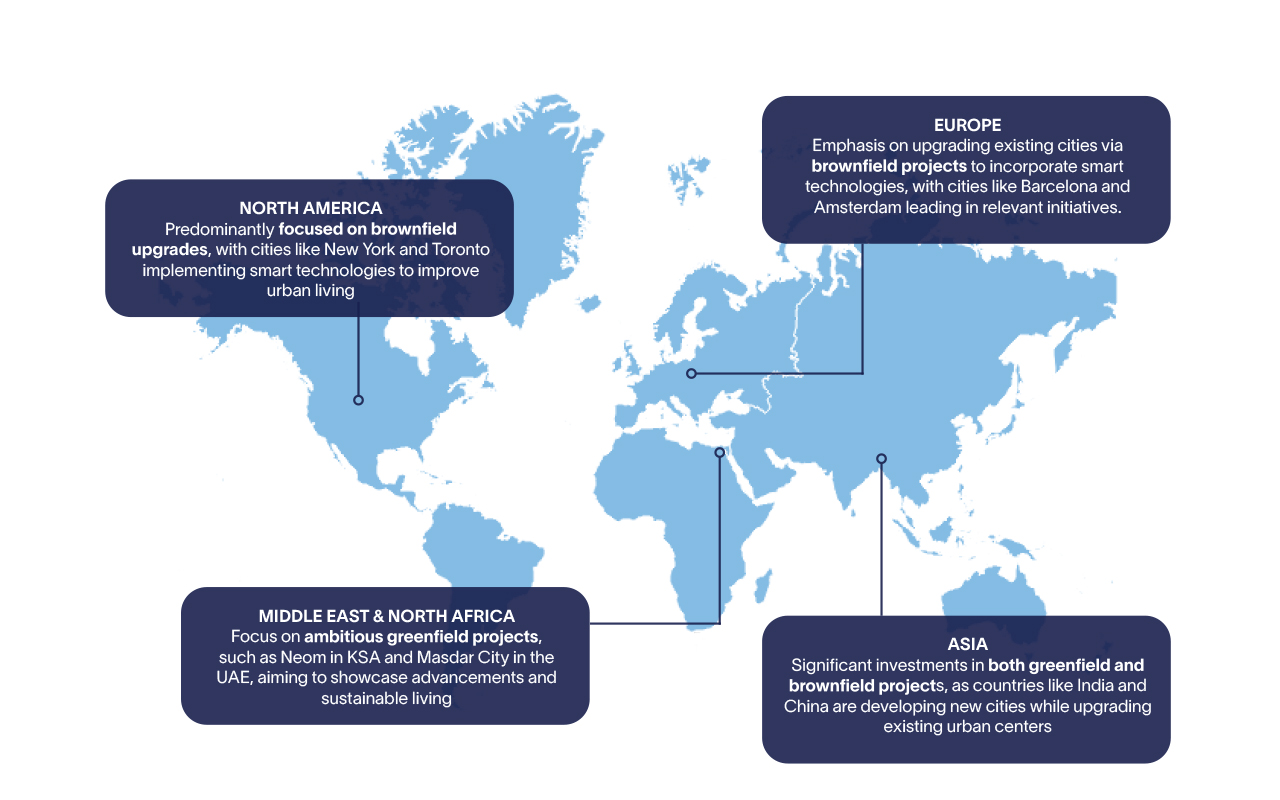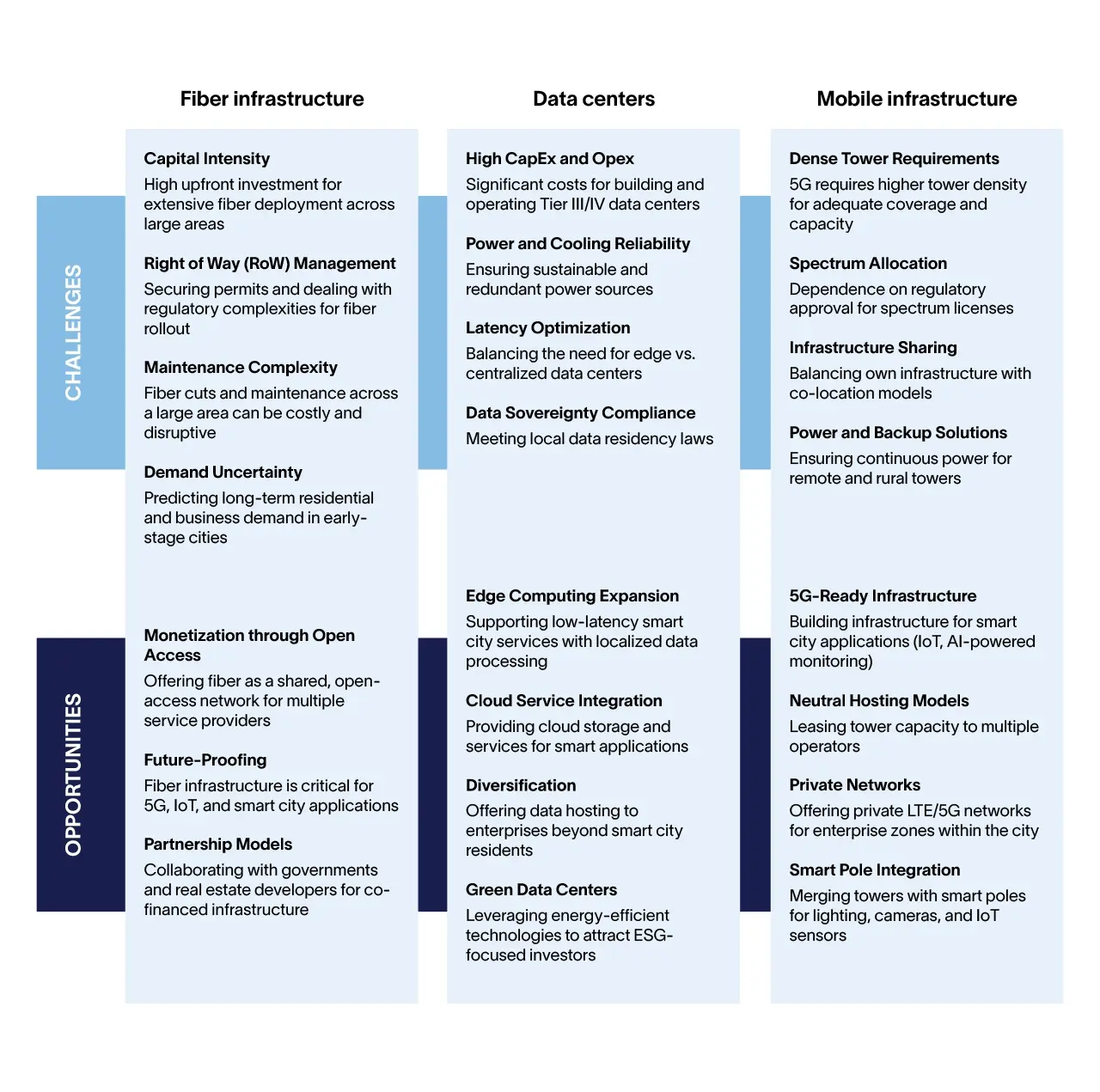As smart city projects come alive, telco companies must assess the associated business risks and opportunities. These projects can range from hospitality-focused destinations, like Egypt's Ras Al Hekma, to industrial-focused areas like Saudi Arabia's Oxagon, to Singapore's brownfield initiatives. Ambitious projects, often in the Middle East, Africa, and Asia, to build completely new cities offer greenfield opportunities for operators. With significant funding often from sovereign wealth funds, they can be an attractive revenue source.
Yet many telcos lose money on smart city projects. Incomplete information and misdirected investments are frequent culprits. Altman Solon has analyzed examples of smart cities across the globe, each with its own footprint and project performance. We use our findings to discuss smart city challenges, opportunities, and best practices for telcos.
The CityTech playing field
Smart city projects can take decades to complete. During this time, specific CityTech products and services that enable them can evolve rapidly. By comparison, overarching smart city goals and the strategies to serve them are more durable. They include:
- Improvement of urban management with sensors, artificial intelligence (AI), and automation.
- Sustainable development through greater energy efficiency, smart power grids, and better waste management.
- Efficient transportation, based on public transport enhancement, electric vehicles, and intelligent traffic systems.
- Residential and digital security using surveillance, smart city lighting, and cybersecurity.
These objectives and solutions are linked by their need for connectivity, at local, metropolitan, and wide area levels. The requisite infrastructure may vary significantly between smart cities. Fiber networks, mobile communications towers, 5G coverage, data centers, and cloud data management and processing are all examples.
Smart cities need more than just technology
Smart cities are, by their nature, technology-driven. However, it would be a mistake to think that technology alone ensures the success of a smart city. Our research shows that smart city success requires diligence in multiple dimensions. Sustainable and future-proof infrastructure must mesh with integration of local cultures, robust project management, environmental, social, and governance (ESG) requirements, and realistic expectations.
Consequently, smart city projects need planning, governance, and operating models that can adapt to changes bound to occur during each smart city development cycle. The optimal choices in each case will be the ones that best satisfy the smart city residents and businesses, attract the investment required, and enable a smart city project that respects scope, budget, and delivery dates.
Managing risk and pacing investment
Assessing the status and momentum of a smart city project means defining criteria for success and knowing what today’s successful smart city projects look like. With this information, telcos have a basis on which to make objective evaluations. The same approach applies for troubled projects and the identification of major problem areas. Telcos can then direct their budgets and investments towards the domains that best combine project needs and revenue generation or reschedule them for later if appropriate.
Our ranking of selected smart cities across continents shows that the success factors are the following:
- Phased investments from diversified funding sources.
- Mixed-use developments and establishment of cultural hubs.
- Modular deployment of technology and phased rollout.
- Implementation of circular economy principles and smart grids.
- Streamlined regulatory and bureaucratic processes.
- Clear governance models with extensive citizens engagement.
- Seamless integration of local norms and traditions.
- Climate-resilient infrastructure and flexible technologies.
- Balanced growth with a focus on community.
A smart city project is a long-term balancing act. Urban planning, services, and smart technology must work together for long-term viability. Embedding smart technologies from inception optimizes efficiency, but projects must remain sustainable financially and socially over decades.
Phased development and flexibility are key principles for investors and project planners, which means they become strategically important for telcos who serve as project partners. Bilateral collaboration between telcos and the principal sponsors, essential to avoid divergence, also accelerates progress.
Revenue opportunities for telcos
Operators can unlock revenue potential by leveraging their telco assets in the smart city ecosystem. They can thrive by focusing on partnerships, open-access infrastructure, and flexible operating models designed for smart city needs. Each business area will present opportunities and challenges for telcos to consider as they define their own business plans.











